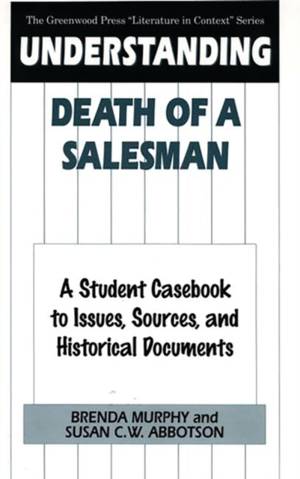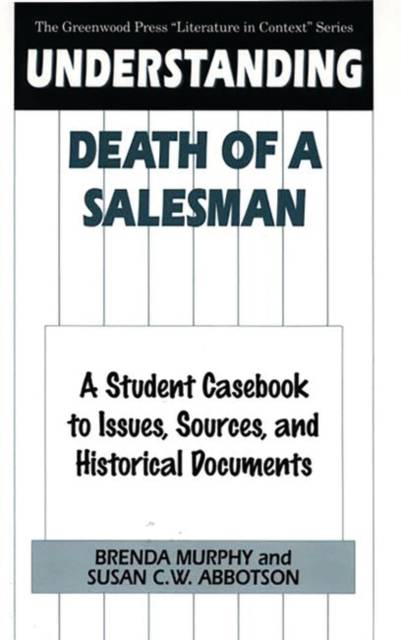
- Retrait gratuit dans votre magasin Club
- 7.000.000 titres dans notre catalogue
- Payer en toute sécurité
- Toujours un magasin près de chez vous
- Retrait gratuit dans votre magasin Club
- 7.000.000 titres dans notre catalogue
- Payer en toute sécurité
- Toujours un magasin près de chez vous
Understanding Death of a Salesman
A Student Casebook to Issues, Sources, and Historical Documents
Brenda Murphy, Susan AbbotsonDescription
This collection of social, cultural, and historical documents and popular materials, with linking explanations and commentary, will help the reader to study the play in the context of its time and cultural background. The collected materials are designed to work with the play to highlight inherent conflicts within American society which lie at the heart of Death of a Salesman, and to explore how the play affects and is affected by social mores and beliefs. Salesmanship and the changing face of business, along with perceptions of sports, gender, and families, are explored through selections drawn from a rich variety of sources that help provide forceful evidence of the play's influence. Documents include essays, articles, and fiction, which have created or explored the social expectations of a typical American family in the late 1940s; unusual selections such as a self-analysis chart, an obituary, and a diary, which help to trace the history of salesmanship from the nineteenth century to the present day; and advertisements, song lyrics, speeches, how-to books, and other readings that promote an interdisciplinary study of the play.
More than 70 short primary documents illustrate the cultural, social and historical milieu of the time in which the play takes place. Topics explored under Cultural Myths and Values include the Protestant work ethic vs. myths of success, the myth of the golden West vs. urban myth, and the culture of youth vs. the culture of age. A chapter on economic forces provides materials on business vs. morality, humanity vs. technology, the haves and the have-nots, American business culture, the Depression, and how to be an effective salesman. A chapter on family and gender expectations includes documents on the roles of fathers and mothers, providers vs. cowboys or playboys, and homemakers vs. call girls. A chapter on sports and leisure features documents on amateur football and sports and American values. A final chapter examines the impact of Death of a Salesman on American culture. Each chapter is followed by study questions, topics for writing and discussion, and a list of suggested reading. This work is an ideal companion for interdisciplinary study of the play.Spécifications
Parties prenantes
- Auteur(s) :
- Editeur:
Contenu
- Nombre de pages :
- 248
- Langue:
- Anglais
- Collection :
Caractéristiques
- EAN:
- 9780313304026
- Date de parution :
- 28-02-99
- Format:
- Livre relié
- Format numérique:
- Genaaid
- Dimensions :
- 163 mm x 241 mm
- Poids :
- 557 g







